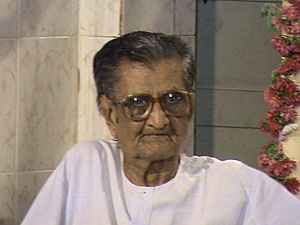Sudhakar Chaturvedi facts for kids
Quick facts for kids
Sudhakar Chaturvedi
|
|
|---|---|
| ಸುಧಾಕರ್ ಚತುರ್ವೇದಿ | |

Pandit Chaturvedi in 2008
|
|
| Born |
Sudhakar Krishna Rao
20 April 1897 (claimed) |
| Died | 27 February 2020 |
| Nationality | Indian |
| Known for |
|
Pandit Sudhakar Chaturvedi (ಸುಧಾಕರ್ ಚತುರ್ವೇದಿ) was an amazing Indian man who passed away on February 27, 2020. He was a brave activist who fought for India's freedom. He was also a very smart scholar who studied ancient Indian texts called the Vedas. Some people believed he lived to be 122 years old, which would make him one of the oldest Indians ever!
Contents
About Pandit Sudhakar Chaturvedi
His Early Life
Pandit Chaturvedi was likely born on April 20, 1897, in Bangalore, Karnataka, India. He came from a family in Karnataka. From a young age, he studied all the important ancient Indian texts, including the Shastras and the Vedas. He learned these at a traditional school called a Gurukul Kangri University in Haridwar. He was greatly inspired by the teachings of Maharshi Dayananda Saraswati and followed the Arya Samaj movement throughout his life.
Fighting for Freedom
Pandit Chaturvedi earned his special title, "Chaturvedi," because it means "master of the four Vedas." He was a student of Swami Shraddhanand at Gurukul Kangri. There, he earned a high degree for his deep knowledge of the Vedas.
He lived at the same time as Mahatma Gandhi, a famous leader of India's freedom movement. Pandit Chaturvedi first met Gandhi while studying the Vedas. He became a strong supporter of Gandhi's peaceful methods. He saw many important events during the Indian independence movement, including the sad Jallianwala Bagh massacre in 1919.
People called him "Gandhi's Postman" because he helped Gandhi by writing down and delivering letters to important British officials. Gandhi even called him 'Karnataki'. Pandit Chaturvedi was arrested many times, at least 31 times, for his part in the freedom struggle. He was sent to prisons all over India.
After India became free, he was offered a job as a minister in the old Mysore state by Sardar Vallabhbhai Patel, another important leader. But Pandit Chaturvedi chose not to take the job. He also worked hard to unite different parts of the state into one.
His Later Years
Pandit Chaturvedi continued to be inspired by the teachings of Maharshi Dayanand Saraswati and the Arya Samaj. He adopted a son named Arya Mitra and had three grandchildren.
He was the first teacher of Sri Sri Ravi Shankar, a well-known spiritual leader. In 2011, Pandit Chaturvedi joined the India Against Corruption campaign, which fought against dishonesty. He lived in Jayanagar, Bangalore. Even in 2010, he said he worked eight hours every day. This included giving a lecture on the Vedas every Saturday. He woke up very early, around 3 or 3:30 AM, and went to bed by 7 PM. He told people to "follow the instructions in the Vedas and a happy life awaits you." He ate only vegetarian food. He passed away on February 27, 2020.
Awards and Honors
Pandit Chaturvedi received many awards for his important work:
- In 2003, he was honored by Motilal Banarsidass for his contributions to Indology, which is the study of Indian history and culture.
- The Karnataka Sahitya Anuvada Academy gave him an honorary award in 2007–08.
- In 2009, he received a "Socio Economic Development Teacher Award."
- His old university, Gurukul Kangri, honored him in 2010.
- In 2010, he was given a "Living Legend" Award. At this event, he promised to donate his eyes.
- In March 2011, he received a wheelchair.
- On Republic Day in 2010, the Governor of Karnataka honored him.
Books by Pandit Sudhakar Chaturvedi
Pandit Sudhakar Chaturvedi wrote over 40 books in the Kannada language. As of 2008, he was working on publishing Vedic texts in 20 volumes. In 2002, he was announced to be leading a project for the Arya Samaj to publish a very large book (30,000 pages!) in Kannada about the Vedas. By 2009, parts of this huge work were already released.
He was also a key person behind the Bangalore Arya Samaj, which published a Kannada magazine called Veda Taranga.
Here are some of his important books:
- A translation of Satyarth Prakash by Maharshi Dayanand Saraswati into Kannada (ಸತ್ಯಾರ್ಥ ಪ್ರಕಾಶ)
- Rashtra Purusha Yogiraja Maharshi Dayananda Saraswati (ರಾಷ್ಟ್ರ ಪುರುಷ ಯೋಗಿರಾಜ ಮಹರ್ಷಿ ದಯಾನಂದ ಸರಸ್ವತಿ) (A biography of Maharshi Dayanand Saraswati)
- Vedokta Jeevana Patha (ವೇದೋಕ್ತ ಜೀವನ ಪಥ)
- Yoga Pradeepa (ಯೋಗ ಪ್ರದೀಪ)
- Adarsha Manava (ಆದರ್ಶ ಮಾನವ)
- Rigveda Darshana (ಋಗ್ವೇದ ದರ್ಶನ)
- Murtipooje Jignase? (ಮೂರ್ತಿಪೂಜೆ ಜಿಜ್ಞಾಸೆ ?)
- Janmagata Jati Paddhati Veda Virodhi (ಜನ್ಮಗತ ಜಾತಿ ಪದ್ಧತಿ ವೇದ ವಿರೋಧಿ)
- Grace and Glory of Vedic Dharma (English)
- Shanti mattu Sowbhagya (ಶಾಂತಿ ಮತ್ತು ಸೌಭಾಗ್ಯ)
- Vaidika Vivaha SamskaraVidhi (ವೈದಿಕ ವಿವಾಹ ಸಂಸ್ಕಾರವಿಧಿ)
- Bhagawan SriRamachandra (ಭಗವಾನ್ ಶ್ರೀರಾಮಚಂದ್ರ)
- Vedamaata Gayatri (ವೇದಮಾತಾ ಗಾಯತ್ರೀ)
- Upanishad Bhashya (ಉಪನಿಷದ್ ಭಾಷ್ಯ)
- Halavu Nenapugalu (ಹಲವು ನೆನಪುಗಳು)
Many of his books were published by Arya Samaj in Bengaluru. The book 'Halavu Nenapugalu' was published by Pustak Shaki Publications.
See also
 | Tommie Smith |
 | Simone Manuel |
 | Shani Davis |
 | Simone Biles |
 | Alice Coachman |

